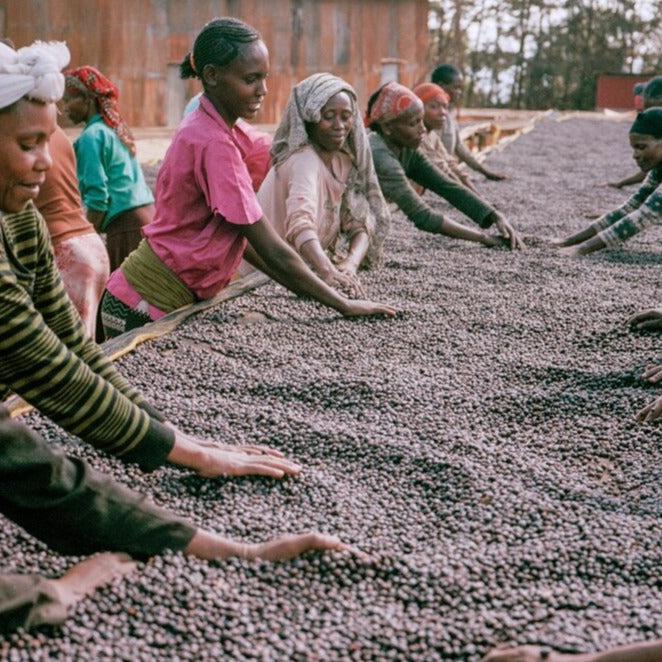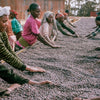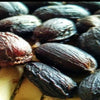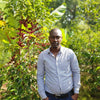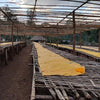Your cart is currently empty!
Ethiopia
Alaka Extended Fermentation Natural - Hambela, Guji
€16.50
Ethiopia Filter
Alaka Extended Fermentation Natural - Hambela, Guji
Possibly the most complex Ethiopian of the year, it was prepared with a variation of the natural process: the cherries, overripen on the shrubs, had an extended natural fermentation under sunlight. In the cup, notes of blueberry compote, orange blossom, plum with a milk chocolate finish, candy sweetness and subtle berry-like acidity. A very enjoyable and complex coffee. Roasts on , ships on
This coffee is possibly the most complex Ethiopian of the year.
It comes from the Guji region of Ethiopia, specifically from the Hambela district.
Situated at an impressive altitude exceeding 2000 m above sea level, this area's unique environment fosters exceptional coffee beans. Vibrant young coffee trees, carefully tended by dedicated local producers, resulting in coffee with distinct flavors that delight enthusiasts worldwide. The region's charm lies in the harmonious blend of agriculture and nature, where Cordia Africana, Acacia, and Albizzia trees provide both shade and character to the beans. The soil, a blend of volcanic fertile red soil and deep sandy loam, contributes to the rich nurturing of these coffee trees.
Alaka coffee derives its name from the Alaka kebele, where it's harvested.
The coffee cherries from Alaka kebele, supplied from 120 small holders, are brought to Hambela Alaka washing station in Guji for further processing.
Entrepreneur Abiyot Boru, a dedicated coffee producer, manages the washing station and multiple coffee farms in the area. His commitment to producing high quality lots is evident in the delightful floral and fruity undertones of this coffee.
Since its establishment in 2005, the washing station has remained a consistent emblem of quality under the attentive management of Abiyot Boru, who has successfully guided its operations ever since.
This particular lot has undergone a w*ne-like process. (* to avoid been blocked 😉)
This process is a variation of the natural process. It involves leaving the cherries on the shrubs to over-ripen before they are harvested.
Such cherries have a higher concentration of sugar once they are harvested than those that are plucked at the peak of the harvest.
Once the coffee fruit is harvested, it is sun-dried for several days in a cool climate at more than 1,800 m above sea level.
During the day, the beans are laid on a surface to dry under sunlight, and then transferred into plastic tubs for storage at night.
While producers repeat the steps above for two weeks to achieve a natural coffee, this extended fermentation process requires 30 – 60 days of the procedure: this is to make sure fermentation takes place within the coffee cherries.
Once the cherries start to resemble raisins, they are then depulped with a depulper machine and then dried until the water level drops (the moisture content) to 12-14%. The final result is a thick and fruity cup profile.
In the cup: notes of blueberry compote, orange blossom, plum with a milk chocolate finish, candy sweetness and subtle berry-like acidity. A very enjoyable and complex cup.
Minimum resting period: 7 days for filter roast.
| Origin |
|---|
| Ethiopia |
| Region |
| Hambela |
| Producer |
| Hambela Alaka Washing Station - Abiyot Boru |
| Elevation |
| 1800 - 2000 masl |
| Varietals |
| Ethiopian Heirloom |
| Processing method |
| Cherries overripen on shurb, extended fermentation under sunlight on raised bed |
| Roast |
| For filter |
| Tasting Notes |
| Blueberry compote, orange blossom, plum with a milk chocolate finish, candy sweetness and subtle berry-like acidity |



